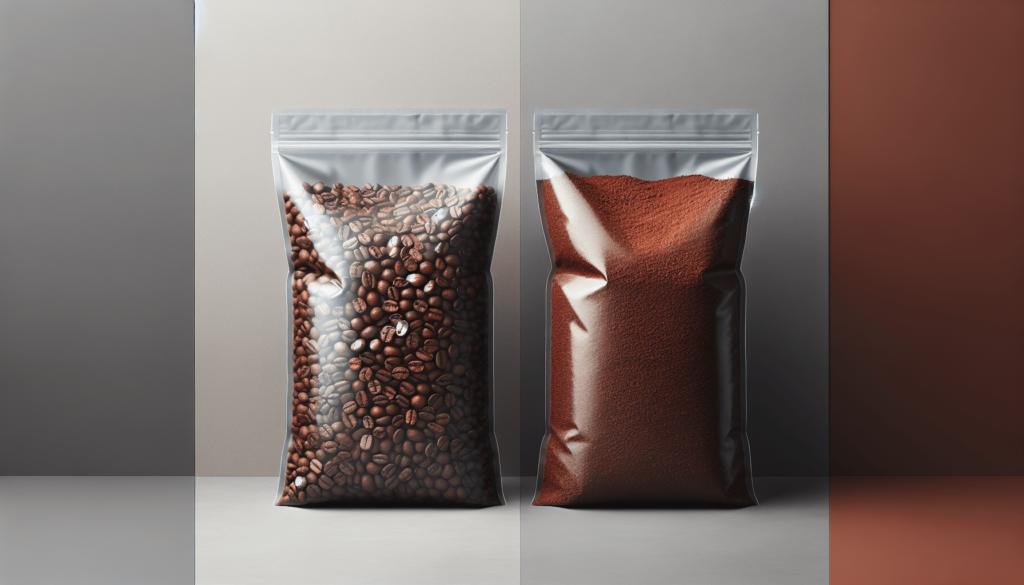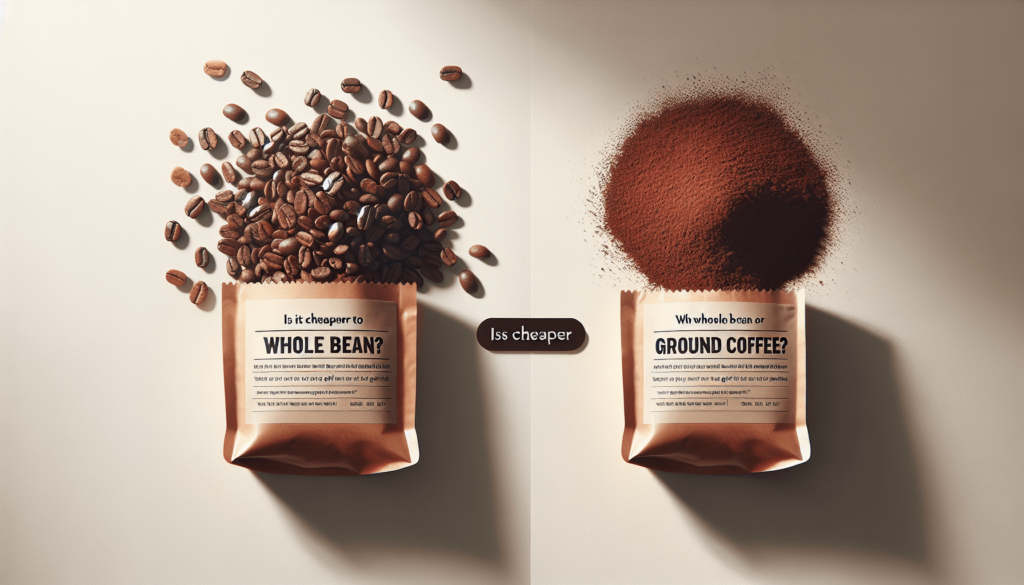Is It Cheaper To Buy Whole Bean Or Ground Coffee?

Introduction
Have you ever walked into a store, approached the coffee aisle, and found yourself puzzled over whether to buy whole bean or ground coffee? It’s a common dilemma for coffee lovers, and it’s not just about the flavor. Price is a significant factor that can influence your decision. So, is it really cheaper to buy whole bean coffee, or should you stick to ground coffee?
In this article, we’ll explore this topic in detail, breaking down the costs associated with both options. By the end, you’ll be equipped to make an informed choice for your daily caffeine fix.
The Basics of Whole Bean and Ground Coffee
Before we delve into the costs, it’s essential to understand what makes whole bean and ground coffee different.
Whole Bean Coffee
Whole bean coffee is exactly what it sounds like: coffee beans that are left in their whole form. This type of coffee is typically preferred by enthusiasts who want to grind their beans fresh right before brewing, believing that it offers superior flavor and aroma.
Ground Coffee
Ground coffee, on the other hand, has already been ground before it reaches the consumer. It’s more convenient because it skips the grinding step, making it faster and easier to brew a cup.
Factors Influencing Coffee Cost
Several factors contribute to the price difference between whole bean and ground coffee. Understanding these factors can help you determine which option might be more economical for you.
Processing Costs
Processing coffee beans into ground coffee usually involves additional steps, which can raise the price. The beans must be ground to a specific consistency, and this process requires equipment and labor. Therefore, the added cost of processing can make ground coffee more expensive than whole bean coffee.
Packaging
Packaging can also influence the cost. Whole beans generally come in bags that preserve freshness, while ground coffee needs more specialized packaging to maintain its quality over time. The packaging used for ground coffee can drive up its price due to requirements for vacuum sealing or nitrogen flushing to extend shelf life.
Waste and Freshness
Whole bean coffee has the advantage of longer shelf life if stored properly, whereas ground coffee can go stale relatively quickly. Coffee lovers who prioritize freshness might find that whole beans offer better value as they can grind small amounts as needed, reducing waste.
Here’s a simple comparison table for clarity:
| Factor | Whole Bean Coffee | Ground Coffee |
|---|---|---|
| Processing Costs | Lower | Higher |
| Packaging | Standard bags | Specialized, air-tight packaging |
| Shelf Life | Longer if stored properly | Shorter, more prone to staleness |
The Calculations: Cost Per Cup
One of the most straightforward ways to determine which option is cheaper is by calculating the cost per cup. Here’s how you can do that.
Whole Bean Coffee Calculation
- Initial Cost: Let’s assume you buy a 1-pound bag of whole bean coffee for $15.
- Yield: On average, a pound of coffee beans can yield about 48 cups of coffee.
- Cost per Cup: [ \text = \frac{\text}{\text} = \frac \approx 0.31 ] So, it costs approximately 31 cents per cup.
Ground Coffee Calculation
- Initial Cost: Suppose you buy a 1-pound bag of ground coffee for $18.
- Yield: Similar to whole bean, a pound of ground coffee also yields around 48 cups.
- Cost per Cup: [ \text = \frac{\text}{\text} = \frac \approx 0.38 ] So, it costs approximately 38 cents per cup.
Here’s a table summarizing the cost per cup:
| Coffee Type | Cost per Pound | Cups per Pound | Cost per Cup |
|---|---|---|---|
| Whole Bean | $15 | 48 | $0.31 |
| Ground | $18 | 48 | $0.38 |
As you can see, while the difference might seem small, it can add up over time, especially if you’re a daily coffee drinker.

Additional Costs to Consider
While the cost per cup is a useful metric, there are other potential costs and savings associated with each option.
Grinder Cost for Whole Bean Coffee
If you opt for whole bean coffee, you’ll need a coffee grinder. The price of grinders can range dramatically, from around $20 for a basic model to several hundred dollars for a high-end electric grinder.
Convenience Factor
Ground coffee offers the convenience of skipping the grinding step. While this might not be a “cost” in monetary terms, the time saved can be valuable, especially on busy mornings.
Potential for Waste
With ground coffee, the risk of it going stale before you can use it all is higher, leading to potential waste and thus, a hidden cost. Whole bean coffee, when stored correctly, has a longer shelf life, reducing the likelihood of wastage.
Flavor and Freshness
For many coffee aficionados, the freshness and flavor achieved by grinding beans just before brewing are priceless. This can make the slightly lower cost per cup of whole bean coffee an even more attractive option.
Bulk Buying: A Cost-Saver?
Buying in bulk can further lower the cost of both whole bean and ground coffee. However, it comes with its own set of considerations regarding storage and freshness.
Whole Bean Coffee in Bulk
When buying whole bean coffee in bulk, you typically get a lower price per pound. However, you’ll need to ensure proper storage to maintain freshness. A cool, dark place like a pantry is ideal, and some even recommend keeping beans in airtight containers or vacuum seal bags.
Ground Coffee in Bulk
Similarly, ground coffee bought in bulk also tends to be cheaper per pound. However, since ground coffee deteriorates faster, the risk of the coffee going stale before you can use it increases. Using airtight containers or vacuum-sealed bags can help, but it’s not a foolproof solution.
Here’s a quick comparison:
| Factor | Whole Bean Coffee in Bulk | Ground Coffee in Bulk |
|---|---|---|
| Cost per Pound | Lower | Lower |
| Risk of Staleness | Moderate if stored properly | High, even with proper storage |
Subscription Services: A Viable Alternative?
With the rise of coffee subscription services, you might wonder if these offer better value. Subscription services can deliver freshly roasted beans or ground coffee right to your door, often at a reasonable price.
For Whole Bean Coffee
Subscriptions for whole bean coffee can ensure you always have fresh beans at a relatively lower cost per pound compared to buying in smaller quantities from a store.
For Ground Coffee
Subscription services can also provide freshly ground coffee, reducing the risk of staleness. However, keep in mind that once coffee is ground, its shelf life diminishes rapidly, so you’ll need to assess how quickly you consume it.
Quality vs. Quantity: What Matters More?
For many coffee drinkers, quality often trumps quantity. If you’re particular about the flavor and aroma of your coffee, whole bean coffee might offer better value, even if it requires an upfront investment in a grinder.
Whole Bean Coffee Quality
Grinding your beans ensures you get the freshest possible coffee, which can result in a more flavorful cup. For many, this quality boost justifies the slight extra effort and cost.
Ground Coffee Quality
While convenient, pre-ground coffee can lose its flavor more quickly due to exposure to air. If convenience is your priority and you consume coffee quickly enough to prevent it from going stale, ground coffee can still be a viable option.
Environmental Impact
Beyond costs, the environmental impact of your coffee choice is an important consideration.
Whole Bean Coffee
Whole bean coffee generally has a lower environmental impact when it comes to processing and packaging. Less energy is consumed in grinding, and packaging materials can be simpler.
Ground Coffee
The additional processing and specialized packaging for ground coffee consume more resources, contributing to a larger carbon footprint. Opting for brands that prioritize sustainable practices can help mitigate this impact.
Here’s a table comparing the environmental impact:
| Factor | Whole Bean Coffee | Ground Coffee |
|---|---|---|
| Processing Energy | Lower | Higher |
| Packaging Materials | Simpler | More complex |
| Environmental Footprint | Lower | Higher |
Consumer Preferences and Trends
Consumer preferences can also influence whether you opt for whole bean or ground coffee. The coffee industry has seen shifts in how people buy and use coffee, and being aware of these trends can help you make a more informed choice.
Growing Popularity of Whole Bean Coffee
In recent years, there’s been a growing preference for whole bean coffee among coffee enthusiasts. This trend is partly driven by the increase in home coffee brewing gadgets and a rising interest in specialty coffee.
Convenience and Ground Coffee
Despite the rising interest in whole bean coffee, ground coffee remains popular for its sheer convenience. Busy lifestyles and the need for quick caffeine fixes make pre-ground coffee a go-to option for many.
Coffee Shop Comparisons
Ever wondered how much you could save by brewing coffee at home compared to buying from a coffee shop? Let’s break it down.
Cost of Coffee Shop Coffee
At a coffee shop, the price of a cup can range from $2 to $5, depending on the location and type of coffee.
Home Brewing Cost
Using our earlier calculations:
- Whole Bean Coffee: $0.31 per cup
- Ground Coffee: $0.38 per cup
Here’s a quick comparison:
| Source | Cost per Cup |
|---|---|
| Coffee Shop | $2 – $5 |
| Home-Brewed (Whole Bean) | $0.31 |
| Home-Brewed (Ground) | $0.38 |
Brewing at home, whether using whole bean or ground coffee, is significantly cheaper.
Conclusion
So, is it cheaper to buy whole bean or ground coffee? The answer largely depends on various factors like processing costs, packaging, and your consumption habits.
In terms of sheer cost per cup, whole bean coffee tends to be more economical, provided you grind the beans yourself. It also offers the added benefits of freshness and superior flavor. While you will need to invest in a grinder, the long-term savings and enhanced coffee experience can make it worthwhile.
Ground coffee, on the other hand, wins in the convenience department. If you need your coffee fast and aren’t as concerned about the slight premium you pay, it can be a good choice, especially if you consume it quickly enough to avoid staleness.
Ultimately, the decision boils down to your priorities and preferences. Whether you opt for whole bean or ground coffee, understanding these cost factors will help you make an informed choice that suits your budget and taste.
Now that you have the information, the next time you find yourself in the coffee aisle, you’ll know exactly which option is the best for you. Enjoy your coffee journey!
